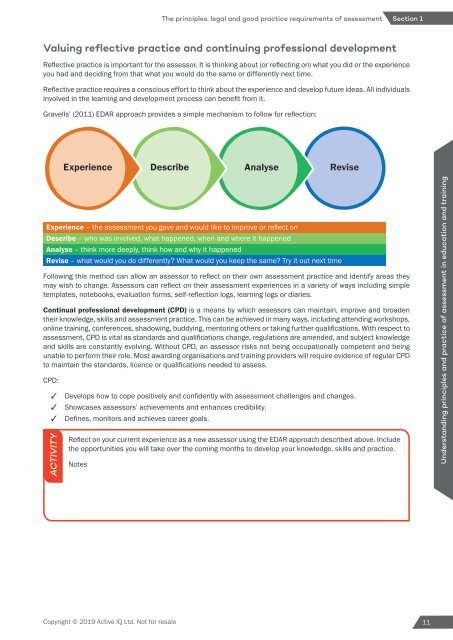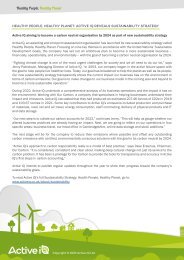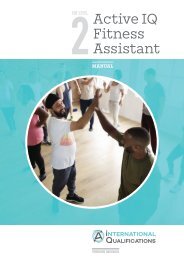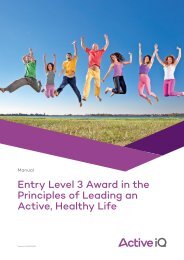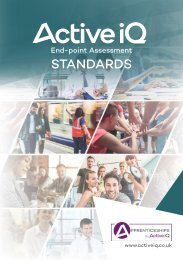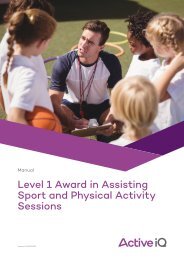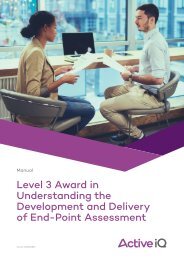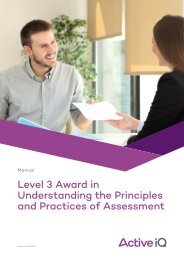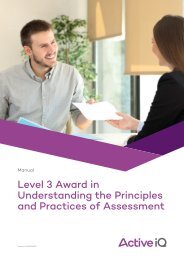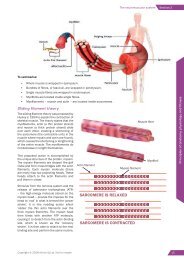Active IQ Level 3 Award in Assessing Vocationally Related Achievement (sample manual)
Create successful ePaper yourself
Turn your PDF publications into a flip-book with our unique Google optimized e-Paper software.
The pr<strong>in</strong>ciples, legal and good practice requirements of assessment<br />
Section 1<br />
Valu<strong>in</strong>g reflective practice and cont<strong>in</strong>u<strong>in</strong>g professional development<br />
Reflective practice is important for the assessor. It is th<strong>in</strong>k<strong>in</strong>g about (or reflect<strong>in</strong>g on) what you did or the experience<br />
you had and decid<strong>in</strong>g from that what you would do the same or differently next time.<br />
Reflective practice requires a conscious effort to th<strong>in</strong>k about the experience and develop future ideas. All <strong>in</strong>dividuals<br />
<strong>in</strong>volved <strong>in</strong> the learn<strong>in</strong>g and development process can benefit from it.<br />
Gravells’ (2011) EDAR approach provides a simple mechanism to follow for reflection:<br />
Experience<br />
Describe<br />
Analyse<br />
Revise<br />
Experience – the assessment you gave and would like to improve or reflect on<br />
Describe – who was <strong>in</strong>volved, what happened, when and where it happened<br />
Analyse – th<strong>in</strong>k more deeply, th<strong>in</strong>k how and why it happened<br />
Revise – what would you do differently? What would you keep the same? Try it out next time<br />
Follow<strong>in</strong>g this method can allow an assessor to reflect on their own assessment practice and identify areas they<br />
may wish to change. Assessors can reflect on their assessment experiences <strong>in</strong> a variety of ways <strong>in</strong>clud<strong>in</strong>g simple<br />
templates, notebooks, evaluation forms, self-reflection logs, learn<strong>in</strong>g logs or diaries.<br />
Cont<strong>in</strong>ual professional development (CPD) is a means by which assessors can ma<strong>in</strong>ta<strong>in</strong>, improve and broaden<br />
their knowledge, skills and assessment practice. This can be achieved <strong>in</strong> many ways, <strong>in</strong>clud<strong>in</strong>g attend<strong>in</strong>g workshops,<br />
onl<strong>in</strong>e tra<strong>in</strong><strong>in</strong>g, conferences, shadow<strong>in</strong>g, buddy<strong>in</strong>g, mentor<strong>in</strong>g others or tak<strong>in</strong>g further qualifications. With respect to<br />
assessment, CPD is vital as standards and qualifications change, regulations are amended, and subject knowledge<br />
and skills are constantly evolv<strong>in</strong>g. Without CPD, an assessor risks not be<strong>in</strong>g occupationally competent and be<strong>in</strong>g<br />
unable to perform their role. Most award<strong>in</strong>g organisations and tra<strong>in</strong><strong>in</strong>g providers will require evidence of regular CPD<br />
to ma<strong>in</strong>ta<strong>in</strong> the standards, licence or qualifications needed to assess.<br />
CPD:<br />
✓<br />
✓<br />
✓<br />
ACTIVITY<br />
Develops how to cope positively and confidently with assessment challenges and changes.<br />
Showcases assessors’ achievements and enhances credibility.<br />
Def<strong>in</strong>es, monitors and achieves career goals.<br />
Reflect on your current experience as a new assessor us<strong>in</strong>g the EDAR approach described above. Include<br />
the opportunities you will take over the com<strong>in</strong>g months to develop your knowledge, skills and practice.<br />
Notes<br />
Understand<strong>in</strong>g pr<strong>in</strong>ciples and practice of assessment <strong>in</strong> education and tra<strong>in</strong><strong>in</strong>g<br />
Copyright © 2019 <strong>Active</strong> <strong>IQ</strong> Ltd. Not for resale 11


